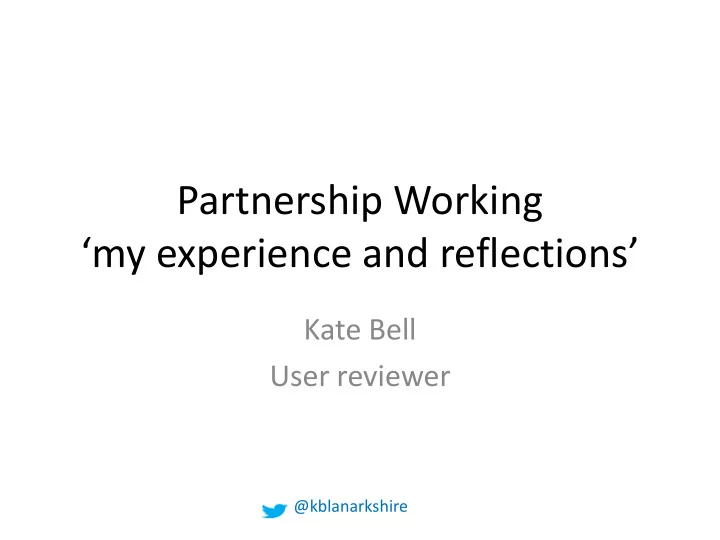

Partnership Working ‘my experience and reflections’ Kate Bell User reviewer @kblanarkshire
Today’s presentation • Who am I • 10 mins whistle stop tour.... To stir the appetite – My personal and professional experience – My reflections on Partnership Working – Insight on what works – Values not Culture – Organisational Models – Implications.....
Who am I... B e l l
Reflections (1) • “ deja vu” – the feeling of having already lived through something • "vu d éjà" — looking at a familiar situation as if you’ve never seen it before. • Reality is subjective -Relationships are doomed if we treat reality as a universal truth • Who we bring to work (values) dictates how we see things and how we negotiate relationships
Experience (1) 1980s 1990s 2000s Coordinated working Interagency working Interprofessional working Shared planning Social inclusion Partnership Working Case Management Shared protocols Whole-systems working Coordinated care Managed care Patient-centred care Care programmes Shared decision-making LTC Management Care management Shared care Working in Partnership Case Management Joint Futures Integrated working
Experience (2) In my experience............ • Partnership Working a Phrase not a defined approach • Normalisation of deviance in healthcare delivery – Banja 2010 • Mixed messages - strategies and policies come and go sometimes unfulfilled? • Initiatives and Projects linger on...... Why? • Not enough research or intelligence based partnership working (structure, process, systems) • What comes around, goes around – Rhetoric vs practice Bell K. et al (2008) • Capacity and Capability – Not sufficiently understood
In ALL projects … Partnership working is about ……
Our people are already stretched in their time. Do we have the rights skills to make partnership working successful? What is needed to get it right? How can they do even more? It is not the case if people spend 20% of their energy on partnership working, and 80% of energy on their day job job.
Reflection (2) • Very welcome research of the evidence base • The theory vs practice • Simplicity/Complexity/Context • Good examination of what the divide is between: – what we know to be good Partnership Working (plenty of brilliant examples) and – Shared experience of what happens in a lot of Partnership Working
Active Partnerships work best when I show.... Values not Culture • Openness • Open to new ideas • Transparency • Open to being influenced • Authenticity • Can be who i am at all times (say what i mean, mean what i say) • Show I can be impacted, not • Willingness hiding behind titles/professions/cultures • Integrity (intimacy) • Willingness to be vulnerable • Intensity • Willingness to stretch beyond my comfort zone
People Support Change When They… � Relate to the vision. � Expect personal gain. � Give input. � Respect the leader. � Believe the time is right. Source: 1996, Leading Change, John Kotter
Deming’s System of Profound Knowledge Appreciation of a system Theory of Knowledge Psychology Understanding Variation Knowledge for Improvement
Institute for Healthcare Improvement (IHI) Framework for Leadership for Improvement
What is Scotland Model
Reflections (3) Talking points: • How to acknowledge the checklist – diagram 1 • Is Partnership working core business or a temporary endeavour for the most complex wicked issues • How to make the landscape less messy – more precise research – investment in people; skills, capacity to get it right • Explore the barriers to spread of what works, understand context (Context - not everywhere is the same set up) • Once for Scotland approach – HEI support for public sector work • High Performing Organisations – 9 Attributes
Implications • Unprecented levels of change, process re-engineering, incremental to transformational • If Partnership Working is not easily defined it is difficult to take a structured approach to change • Realising change takes time, fail to plan, plan to fail • Risk of further fragmentation as we work through 31 new Integrated Authorities • Confusion, delays, reasons change fails • Risk of further fragmentation of service delivery, how do we continuously improve
Recommend
More recommend